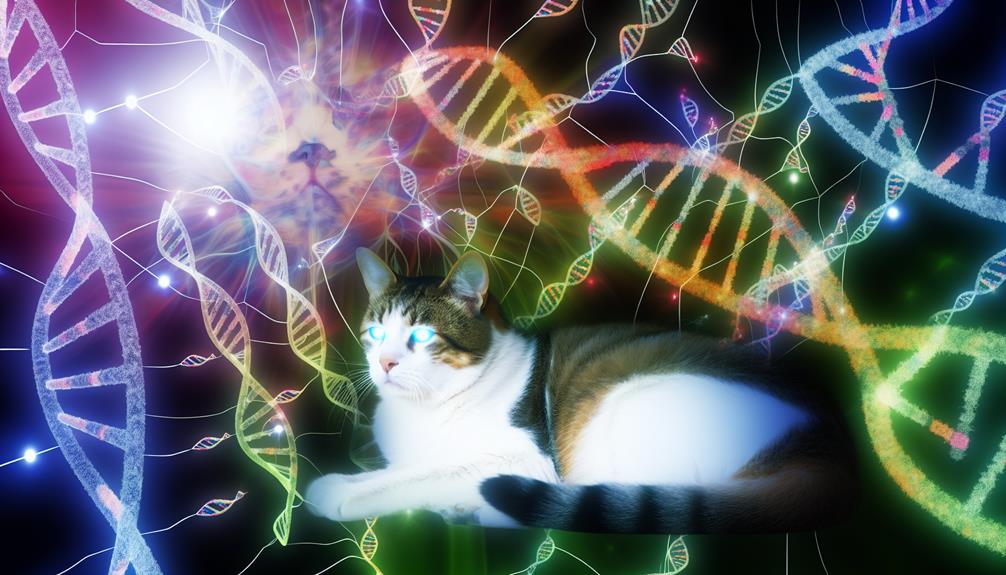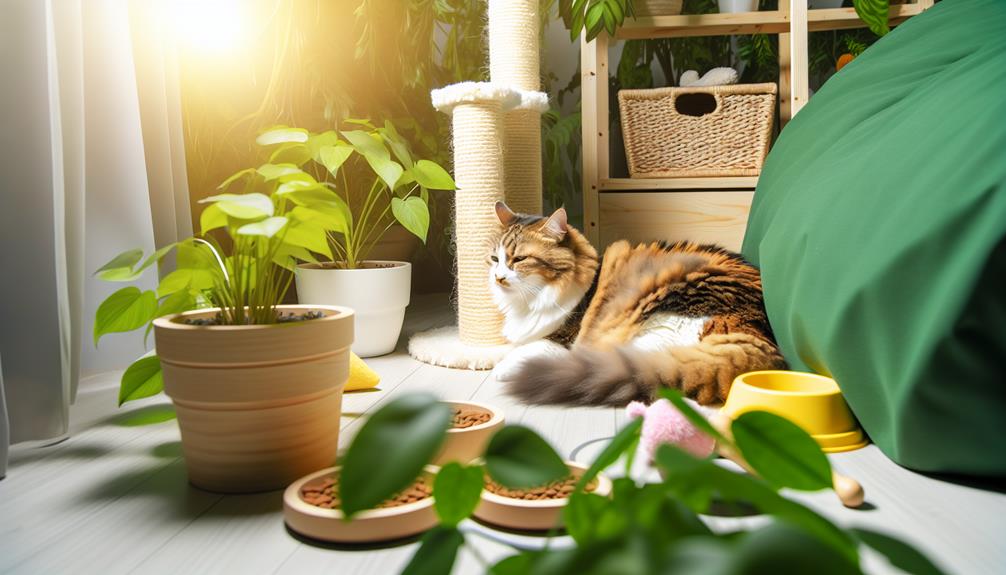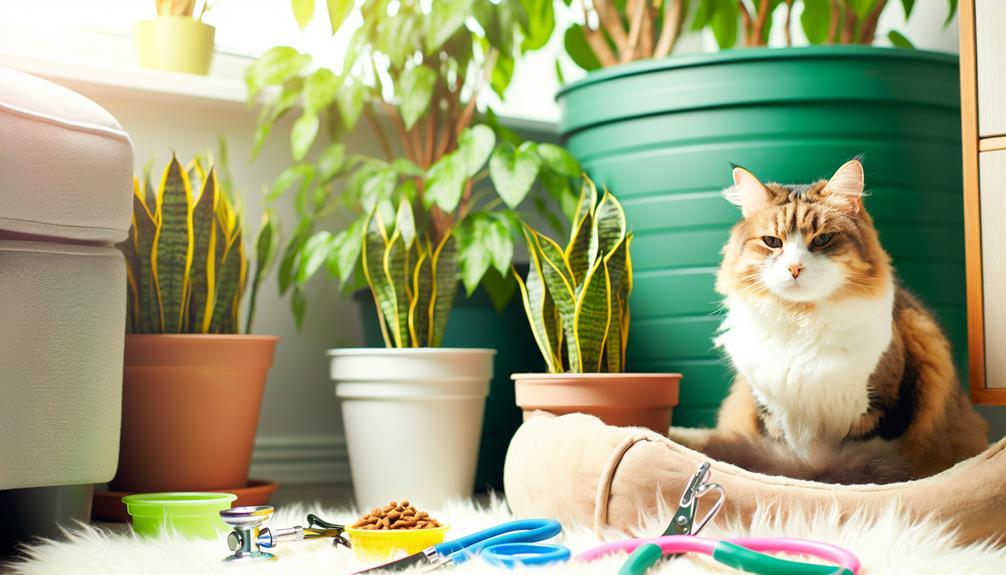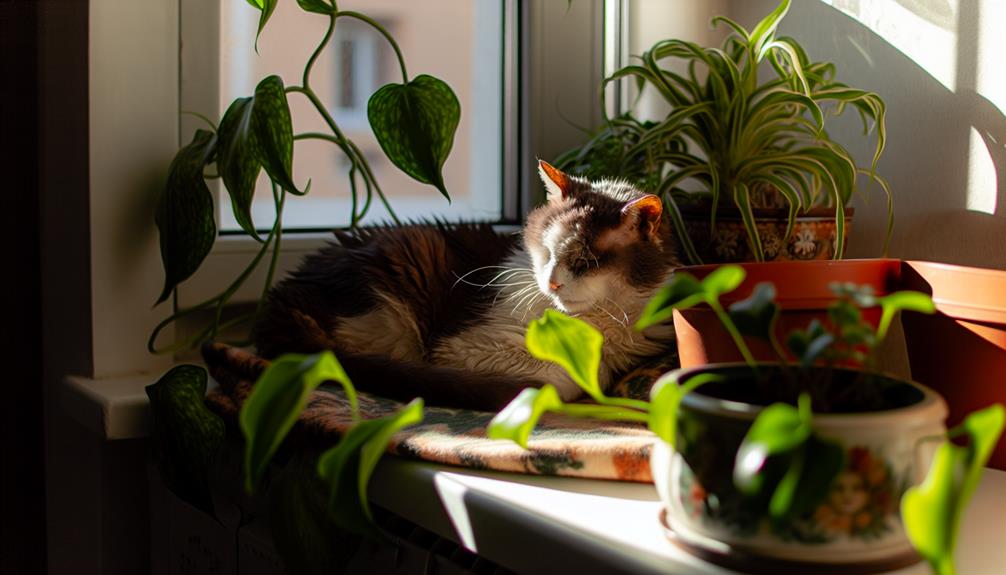Have you ever wondered how long your feline friend might stick around? On average, domestic cats live between 12 to 15 years, but some can reach their late teens or even early twenties with the right care. Factors like breed, environment, diet, and veterinary attention play pivotal roles in determining their lifespan. For instance, indoor cats often live longer compared to their outdoor counterparts. But what exactly makes such a significant difference, and how can you guarantee your cat enjoys a long, healthy life? Let's explore this intriguing topic further.
Average Lifespan of Domestic Cats
When considering the average lifespan of domestic cats, it's important to understand the various factors that can influence their longevity. Domestic cats generally have an average lifespan ranging from 12 to 15 years, although many can live into their late teens or even early twenties under ideal conditions. However, the longevity of a cat can differ greatly depending on several variables, including cat breeds and whether they live indoors or outdoors.
Different cat breeds exhibit varying lifespans. For instance, some breeds like the Siamese and Burmese are known for their longer life expectancy, often reaching 15 to 20 years. Conversely, breeds such as the Maine Coon and the Persian tend to have shorter average lifespans, usually around 12 to 15 years. Genetic predispositions to certain diseases play a vital role in these disparities. It's not merely about breed-specific traits but also about the inherited genetic health profile each breed carries.
The distinction between indoor vs outdoor cats is another significant factor in determining lifespan. Indoor cats generally have a longer lifespan compared to their outdoor counterparts. This is primarily due to reduced exposure to risks such as infectious diseases, physical trauma from accidents, and predation. Indoor cats benefit from a controlled environment that minimizes these hazards, thereby promoting a longer, healthier life.
Factors Affecting Cat Longevity
Understanding the average lifespan of domestic cats lays the groundwork for a deeper exploration into the factors affecting cat longevity. One of the primary determinants is whether your cat lives indoors or outdoors. Indoor living greatly boosts lifespan by reducing exposure to numerous hazards such as traffic accidents, infectious diseases, and predation. Indoor cats can live up to 15-20 years, whereas outdoor cats often face a reduced lifespan of about 5-7 years due to these risks.
Breeding practices also play an essential role in longevity. Responsible breeding practices guarantee that hereditary health issues are minimized, creating a more robust gene pool. For instance, certain breeds are predisposed to specific genetic conditions that can reduce lifespan if not managed properly. By selecting breeding pairs carefully, breeders can mitigate these risks and enhance longevity.
Furthermore, diet and nutrition are vital. High-quality, balanced diets help maintain peak health, preventing obesity and related diseases such as diabetes and arthritis. Regular veterinary check-ups and vaccinations are also important. These preventive measures allow for early detection and treatment of health issues, greatly extending your cat's life expectancy.
Environmental enrichment is another factor. Providing mental and physical stimulation through toys, climbing structures, and interaction can reduce stress and improve overall well-being. Stress is a known factor that can exacerbate various health conditions, thereby shortening lifespan.
Lastly, spaying or neutering your cat can prevent numerous health problems, including certain cancers and infections, further contributing to a longer, healthier life. By focusing on these factors—indoor living, responsible breeding practices, proper nutrition, regular veterinary care, environmental enrichment, and spaying/neutering—you can greatly influence your cat's longevity and quality of life.
Genetic Influences on Lifespan

Genetics play an essential role in determining your cat's lifespan, influencing everything from susceptibility to diseases to overall physical resilience. Lifespan genetics focus on the variations within your cat's DNA that dictate how long they might live. Certain genetic predispositions can greatly affect their health markers and longevity.
Key Genetic Influences on Lifespan:
- Breed Characteristics: Specific breeds have inherent genetic traits that can either extend or shorten their lifespan. For instance, Siamese cats often live longer due to robust genetic makeup, while breeds like the Maine Coon are predisposed to certain hereditary diseases such as hypertrophic cardiomyopathy.
- Hereditary Diseases: Some cats inherit genetic mutations that predispose them to chronic conditions and illnesses. Polycystic kidney disease (PKD) is prevalent in Persian and Exotic Shorthair cats, affecting their kidneys' functionality and consequently their lifespan.
- DNA Variation: Not all genetic variations are harmful. Some can contribute positively to your cat's health and longevity. These beneficial variations can enhance immune response and reduce susceptibility to common feline diseases.
- Health Markers: Genetic testing can identify specific health markers that provide insights into potential health risks. By understanding these markers, you can take preemptive measures to mitigate risks associated with your cat's genetic background.
Understanding your cat's genetic predisposition can guide you in providing tailored care to maximize their lifespan. By recognizing breed characteristics and hereditary diseases, you can proactively manage their health. Genetic testing can offer valuable insights into DNA variations and health markers, helping you address potential issues before they become serious problems.
Importance of Diet and Nutrition
A balanced diet is critical for guaranteeing your cat's longevity and overall well-being. Proper nutrition greatly impacts a cat's metabolic functions, immune system, and organ health. High-quality cat food should be your primary focus, as it provides fundamental macronutrients like proteins, fats, and carbohydrates, in the right proportions. Proteins are crucial for tissue repair and growth, while fats provide a concentrated source of energy and aid in the absorption of fat-soluble vitamins.
In addition to macronutrients, micronutrients such as vitamins and minerals are essential. For instance, taurine, an amino acid found in animal tissues, is vital for heart and eye health. Deficiencies in taurine can lead to severe conditions like dilated cardiomyopathy and retinal degeneration.
Nutritional supplements might be necessary in certain situations, especially for cats with specific health conditions or dietary restrictions. Omega-3 fatty acids, commonly found in fish oil supplements, are known to reduce inflammation and support joint health. Probiotics can enhance gastrointestinal function and bolster the immune system. However, it's crucial to consult your veterinarian before introducing any supplements to guarantee they are appropriate for your cat's specific needs.
Commercial cat foods are designed to meet the nutritional requirements set by organizations like the Association of American Feed Control Officials (AAFCO). Always check for the AAFCO statement on the packaging to verify the product meets these standards. Avoid feeding your cat human food or overly processed treats, as they often lack necessary nutrients and may contain harmful substances.
Role of Environment and Lifestyle

The environment and lifestyle your cat is exposed to can greatly influence its lifespan and quality of life. Cats living indoors typically enjoy a longer life expectancy compared to their outdoor counterparts. Outdoor cats face numerous hazards such as traffic, predators, and diseases, which can remarkably reduce their lifespan. Conversely, indoor cats are shielded from these dangers, resulting in a safer, more controlled environment.
From a clinical perspective, social interactions also play an essential role in your cat's well-being. Cats are social animals that benefit from regular interaction with both humans and other pets. Proper socialization can prevent behavioral issues and promote mental health, contributing to a longer, happier life.
To optimize your cat's environment and lifestyle, consider the following factors:
- Indoor Living Conditions: Verify your indoor cat has ample space, stimulating toys, and scratching posts to mimic natural behaviors and prevent obesity.
- Safe Outdoor Access: If you choose to allow outdoor access, consider a secured outdoor enclosure or supervised outings to mitigate risks while providing enrichment.
- Social Interactions: Facilitate regular social interactions, whether through playtime with you, another cat, or even a compatible dog, to enhance their psychological well-being.
- Environmental Enrichment: Incorporate various forms of environmental enrichment, such as puzzle feeders and climbing structures, to keep your cat mentally stimulated and physically active.
Veterinary Care and Regular Checkups
Regular veterinary care is indispensable for ensuring your cat's longevity and overall health. By adhering to a systematic approach involving preventive measures and scheduled checkups, you can considerably reduce the risk of chronic diseases and acute conditions. Regular visits allow veterinarians to detect early signs of illness that you might overlook, such as subtle weight changes, dental issues, or abnormalities in behavior.
Vaccination schedules are a significant component of preventive care. Ensuring your cat is up-to-date with core vaccines, like those for feline viral rhinotracheitis, calicivirus, and panleukopenia (FVRCP), as well as rabies, can prevent life-threatening diseases. Depending on your cat's lifestyle and risk factors, your veterinarian might recommend additional vaccines, such as those for feline leukemia virus (FeLV) or Bordetella.
Routine blood work and diagnostic tests are also essential. These tests can reveal underlying issues like kidney disease, hyperthyroidism, or diabetes before they manifest clinically. Early detection leads to timely intervention, which can considerably prolong your cat's life and improve their quality of life.
Parasite control is another essential aspect of regular veterinary care. Internally, cats can suffer from infestations of worms, which can be detected through fecal exams. Externally, flea and tick prevention is crucial, especially for outdoor cats. Regular deworming and topical treatments effectively prevent these infestations.
Regular dental checkups can't be ignored either. Dental diseases are not only painful but can also lead to systemic infections affecting the heart and kidneys. Routine cleanings and at-home dental care play a pivotal role in maintaining oral health.
Tips for a Long, Healthy Life

To guarantee your cat enjoys a long, healthy life, you'll need to focus on several key areas. Prioritize a balanced diet rich in essential nutrients, schedule regular veterinary checkups to monitor and maintain overall health, and provide ample mental and physical stimulation to keep your cat's mind and body active. These strategies are critical in mitigating health risks and promoting longevity.
Balanced Diet Essentials
Guaranteeing your cat consumes a balanced diet is critical for maximizing their lifespan and maintaining ideal health. A diet rich in essential nutrients supports various physiological functions, including immune response, cellular repair, and energy metabolism. Proteins, fats, vitamins, and minerals must be appropriately balanced to meet your cat's nutritional needs.
To achieve this, consider these key dietary components:
- Proteins: Essential for muscle maintenance and repair. Animal-based proteins such as chicken or fish are preferable due to their complete amino acid profile.
- Fats: Necessary for energy and the absorption of fat-soluble vitamins (A, D, E, K). Omega-3 and Omega-6 fatty acids promote a healthy coat and skin.
- Vitamins and Minerals: Important for metabolic functions and preventing deficiencies. Taurine (an amino acid) is particularly crucial for heart and eye health.
- Water: Often overlooked, but hydration is vital for renal function and overall health. Make sure fresh water is always available.
Feeding schedules should be consistent to regulate metabolism and prevent obesity. Typically, offering 2-3 small meals per day is ideal. Regularly consult with a veterinary nutritionist to tailor the diet to your cat's specific needs, guaranteeing they receive all necessary essential nutrients.
Regular Vet Checkups
While maintaining a balanced diet is foundational for your cat's health, routine veterinary checkups play an equally important role in extending their lifespan. Regular vet visits allow for the implementation of preventive healthcare measures, which can identify and mitigate potential health issues before they become severe. A thorough examination includes checking essential signs, dental health, and body condition score, all critical indicators of your cat's overall well-being.
Adhering to a strict vaccination schedule is another fundamental aspect. Vaccinations protect against common feline diseases such as feline leukemia virus (FeLV) and feline immunodeficiency virus (FIV), both of which can greatly shorten your cat's lifespan. Your veterinarian will tailor a vaccination protocol based on your cat's age, health status, and lifestyle, ensuring maximum protection.
Moreover, routine blood tests and urinalysis can detect early signs of chronic conditions like kidney disease or diabetes, conditions which are more manageable when diagnosed early. Regular deworming and flea control also fall under preventive healthcare, protecting your cat from parasites that can cause severe health problems.
Mental and Physical Stimulation
Although often overlooked, mental and physical stimulation are crucial for a domestic cat's longevity and overall health. Providing an enriching environment can mitigate stress, prevent obesity, and enhance cognitive function. Engaging your cat in playful activities and using interactive toys can considerably impact their well-being.
Here are four scientifically-backed strategies to guarantee your cat receives adequate mental and physical stimulation:
- Interactive Toys: Toys such as puzzle feeders and laser pointers can keep your cat mentally engaged and physically active. These tools stimulate predatory instincts and promote exercise, reducing the risk of obesity and associated health problems.
- Play Sessions: Regular, scheduled play sessions can help maintain your cat's agility and cardiovascular health. Activities mimicking hunting behaviors, like chasing feather wands, contribute to muscle tone and joint health.
- Environmental Enrichment: Providing climbing structures, scratching posts, and window perches can enhance your cat's environment. These additions encourage exploration and physical activity, which are essential for maintaining ideal health.
- Social Interaction: Social play with humans or other cats can foster mental stimulation and emotional well-being. Interaction reduces anxiety and boredom, which can lead to destructive behaviors.
Conclusion
In summary, your cat's longevity hinges on a blend of genetics, diet, environment, and veterinary care. By ensuring high-quality nutrition and regular health check-ups, you can greatly extend your feline friend's lifespan. Indoor living offers a safer, longer life, potentially reaching up to 20 years. Remember, an ounce of prevention is worth a pound of cure; proactive care is essential for a healthy, happy cat. Prioritize these factors, and you'll add years to your cat's life.
